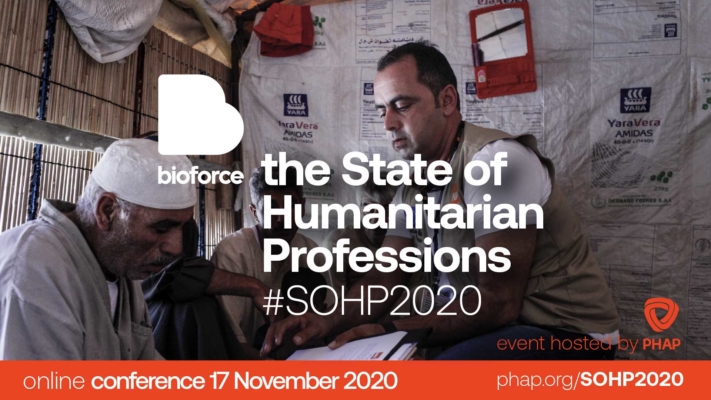
- This event has passed.
نوفمبر
17
The State of Humanitarian Professions 2020, Online, 17 Nov 2020
17 نوفمبر 2020
9:30 صباحًا - 12:30 مساءً

EVENT DETAILS
Registration Deadline
November 17, 2020
Venue
Website
ROLES
Read more and register at https://phap.org/SOHP2020
The capacities of those delivering response to humanitarian crises determine the quality of aid, its relevance, effectiveness, and sustainability, and is key to the effective application of humanitarian principles. But in a rapidly changing aid ecosystem, how can humanitarian organisations better recruit, retain, and develop competent staff? How can individual practitioners have greater clarity on how to enter the aid sector and be effective for people in need? How can learning providers better target the most acute learning needs?
These are some of the questions that the first international study on humanitarian professions attempts to answer – the State of Humanitarian Professions 2020. Over the past year, Bioforce has been carrying out interviews and workshops, as well as a large-scale survey, with humanitarian actors, individual practitioners, and learning and development providers worldwide. The results include insights on the current state of 24 humanitarian professions and what their future will be. In addition, the study has looked at the core competencies across all humanitarian professions, how they are changing and what they will look like in the future.
Join us on 17 November for an online conference launching the State of the Humanitarian Professions 2020 study. This will be an opportunity to learn more about the results of this study, as well as to discuss their wider implications for humanitarian work. We also encourage all registrants to respond to a brief survey (https://phap.org/SOHP2020-COVID19survey) about the impact of COVID-19 on humanitarian professions, the results of which will also be presented during the conference.
For more information about the initiative, please visit the project page: https://phap.org/SOHP2020 .
Event time
New York: 03:30 – 06:30
London: 08:30 – 11:30
Geneva: 09:30 – 12:30
Amman: 10:30 – 13:30
Nairobi: 11:30 – 14:30
Bangkok: 15:30 – 18:30
Manila: 16:30 – 19:30
EVENT DETAILS
Registration Deadline
November 17, 2020
